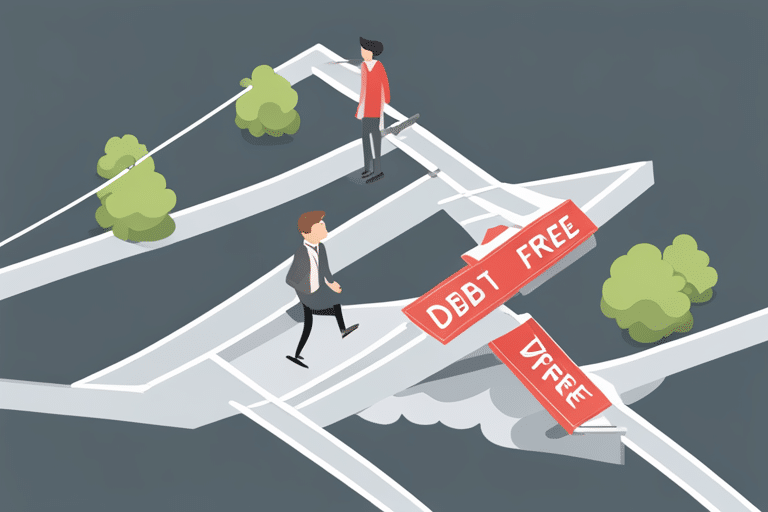Imagine you’re cruising along on your debt-free journey, feeling like nothing can stop you. But suddenly, out of nowhere, a financial setback hits you like a tidal wave. Don’t panic! This article is here to guide you through the choppy waters and help you navigate your way back to smooth sailing.
We’ll show you how to:
– Assess the situation
– Review your budget
– Prioritize expenses
– Seek additional income
– Cut back on non-essential spending
– Consider temporary employment
– Seek professional advice
– Stay positive and focused
– Learn from the experience.
Get ready to conquer those setbacks like a true master of your finances!
Key Takeaways
- Assess the financial implications of the setback and adjust your budget accordingly
- Prioritize essential expenses and cut back on non-essential spending
- Utilize emergency funds as a temporary financial relief
- Seek additional income through temporary employment or side hustles
Assessing the Situation: Understanding the Impact of the Setback

Before you can develop a plan to overcome the setback, it’s important to assess the situation and understand how it will impact your debt-free journey.
Picture this: you’re sailing smoothly on your debt-free ship, cruising towards financial freedom. Suddenly, out of nowhere, a storm hits. The waves crash against your boat, threatening to capsize all your progress. But fear not! You are equipped with the power of assessment.
Assessing the impact of a setback means taking a step back and looking at the bigger picture. How does this unexpected financial hurdle affect your grand goal? Will it delay your arrival at Debt-Free Island or completely derail your plans? Understanding these implications is crucial because it allows you to strategize effectively.
Take a moment to evaluate the financial implications of this setback. Are there additional expenses that need to be accounted for? Will you have to adjust your repayment plan or put other goals on hold temporarily? By honestly assessing how this setback affects your overall financial situation, you can make informed decisions moving forward.
As you analyze the impact of this stormy setback on your debt-free journey, remember that setbacks are just temporary detours in the road to success. Now that you have assessed the situation and understood its effects, it’s time to transition into reviewing your budget and identifying areas for adjustment.
Reviewing Your Budget: Identifying Areas for Adjustment

So, you’ve assessed your financial situation and now it’s time to dive into your budget.
Let’s talk about necessary expenses versus luxuries and how cutting back on non-essentials can help you reach your debt-free goals faster.
Think of it as a game of prioritizing what truly matters while still enjoying life’s little indulgences.
Necessary Expenses Vs. Luxuries
It’s important to distinguish between necessary expenses and luxuries when facing unexpected financial setbacks on your debt-free journey. Here are four vivid scenarios to help you prioritize your spending:
-
Imagine walking into a cozy coffee shop, the scent of freshly brewed coffee wafting through the air. While that latte may be tempting, think about whether it’s a necessity or a luxury.
-
Picture yourself strolling down the aisles of a high-end boutique, surrounded by racks of designer clothes. That stunning dress might catch your eye, but ask yourself if it’s an essential purchase or simply an indulgence.
-
Close your eyes and imagine dining at a fancy restaurant with elegant décor and exquisite cuisine. Before making reservations, consider if this experience is necessary for sustenance or just a special treat.
-
Envision driving past rows of luxurious cars in a dealership lot, their shiny exteriors glistening in the sunlight. While owning one may seem desirable, reflect on whether it aligns with your current financial goals.
Cutting Back on Non-Essentials
When you’re trying to save money, it’s important to identify non-essential items and cut back on them. But don’t worry, cutting back doesn’t have to be boring or restrictive! Think of it as a fun challenge to find alternatives for your non-essential spending. Let’s take a look at some creative ideas in the table below:
| Non-Essential Spending | Alternative |
|---|---|
| Eating out | Cooking at home and having picnics in the park |
| Subscription services | Borrowing books from the library or sharing streaming accounts with friends |
| Impulse shopping | Making a wishlist and waiting 24 hours before making a purchase |
| Entertainment | Hosting game nights or movie marathons at home |
Prioritizing Expenses: Determining What Must Be Paid First

So you’ve got your budget all figured out, but what happens when unexpected expenses come knocking at your door? Don’t worry, we’ve got you covered!
In this discussion, we’ll be diving into the importance of prioritizing essential bill payments, the need for an emergency fund, and how to negotiate payment arrangements in case things get a little tight.
Get ready to tackle those financial hurdles with confidence and a sprinkle of creativity!
Essential Bill Payment
To ensure you stay on track with your debt-free journey, make sure to prioritize essential bill payment. Assessing your financial situation and managing expenses is crucial in maintaining a healthy financial life. Here are four key areas to focus on:
-
Housing: Your home is your sanctuary, so keeping up with mortgage or rent payments should be a top priority. Imagine the peace of mind that comes from knowing you have a roof over your head.
-
Utilities: Electricity, water, and internet services are essential for daily living. Picture yourself enjoying a hot shower or binge-watching your favorite show without any interruptions.
-
Transportation: Whether it’s keeping up with car payments or ensuring you have enough funds for public transportation, reliable mobility is vital. Envision yourself cruising down the road stress-free.
-
Food and groceries: Sustenance is non-negotiable! Make sure you allocate enough money for nutritious meals that nourish both body and soul.
Emergency Fund Importance
Make sure you’ve got enough cash tucked away in your emergency fund to tackle those unexpected expenses that might just pop up out of nowhere. Believe me, they always do! Having an emergency fund is like having a financial superhero by your side, ready to swoop in and save the day when things go haywire. It’s your safety net, your peace of mind, and your ticket to handling any unforeseen costs without breaking a sweat.
Now, let’s talk about the benefits of having an emergency fund. First off, it keeps you from going into debt when life throws you a curveball. No more stressing about how to pay for that sudden car repair or surprise medical bill. With an emergency fund, you’re prepared and in control.
So, how can you build up this superhero-sized stash? Start by setting aside a small portion of each paycheck specifically for emergencies. Make it automatic so you don’t even have to think about it. Another strategy is to cut back on unnecessary expenses (yes, I’m looking at you daily Starbucks run) and put that extra money into your emergency fund.
Negotiating Payment Arrangements
Negotiating payment arrangements can provide you with more flexibility and help alleviate financial stress. When it comes to managing unexpected setbacks on your debt-free journey, temporary relief is key.
Here are four imaginative ways to picture negotiating payment arrangements:
-
Imagine a magical phone call where you explain your situation to the creditor, and they wave their wand of understanding, granting you a lower monthly payment.
-
Picture yourself sitting at a negotiation table, armed with knowledge about eligibility for assistance programs. As you confidently present your case, the creditor nods approvingly and agrees to adjust the terms in your favor.
-
Visualize a giant puzzle, where each piece represents a different aspect of your finances. Through negotiations, you rearrange these pieces until they fit perfectly together, creating a more manageable repayment plan.
-
Envision yourself as a skilled negotiator in a high-stakes game show, competing against debt and financial stress. With each successful negotiation tactic you employ, the prize money accumulates in the form of reduced payments.
By negotiating payment arrangements creatively and strategically, you can find temporary relief while staying on track towards your debt-free goals.
Now let’s explore ways to boost your earnings for long-term financial stability!
Seeking Additional Income: Exploring Ways to Boost Your Earnings

If you’re looking to increase your earnings, have you considered taking on a side hustle or freelancing gig? It’s like having your very own money tree! Imagine the possibilities: exploring freelance opportunities and starting a small business. With a little creativity and determination, you can turn your skills and passions into extra income.
Freelancing is all the rage these days. Whether you’re a talented writer, graphic designer, or web developer, there are countless platforms where you can showcase your expertise and connect with clients from around the world. You could be sipping coconut water on a beach in Bali while working on an exciting project for a client in New York City. The possibilities are endless!
But why stop at freelancing? If you have an entrepreneurial spirit, consider starting your own small business. Maybe it’s that cupcake recipe that everyone raves about or those handmade crafts that always get compliments. Take that passion and turn it into profit!
Starting a small business may sound daunting, but don’t worry! There are plenty of resources available to help you navigate through the process. From online courses to mentorship programs, you’ll find everything you need to set yourself up for success.
Cutting Back on Non-Essential Spending: Trimming Your Budget

Hey, you budget-savvy individual! Let’s dive into a discussion about cutting back on non-essential spending and trimming your budget.
We all know how tempting it is to splurge on those little luxuries, but let’s differentiate between what we truly need and what we just want.
Get ready for some practical ways to save without sacrificing too much of the fun stuff in life!
Essential Vs. Non-Essential
Determining what is essential versus non-essential can greatly impact your ability to navigate unexpected financial setbacks on your debt-free journey. It’s like playing a game of financial Jenga, where you carefully remove the unnecessary blocks and keep the essential ones intact. Here are four items that can help you visualize this process:
-
Imagine your necessary expenses as sturdy foundation blocks, like rent or mortgage payments, utilities, and groceries – these are the backbone of your budget.
-
Non-essential spending can be likened to colorful but precarious blocks placed on top, such as dining out at fancy restaurants or splurging on designer clothes – they may bring temporary joy but can easily topple your financial stability.
-
Prioritizing your financial goals is like strategically placing key support blocks throughout the tower, representing saving for emergencies or paying off high-interest debts.
-
Finally, picture unexpected setbacks as wild gusts of wind that threaten to knock down your tower – it’s crucial to have a solid understanding of essential versus non-essential expenses so you can quickly adapt and rebuild when faced with unforeseen challenges.
Practical Ways to Save
One practical way to save money is by cutting back on unnecessary expenses.
Imagine yourself as a master of practical budgeting, effortlessly navigating the treacherous waters of managing your finances. You become a savvy strategist, meticulously analyzing every purchase and determining if it aligns with your financial goals.
As you conquer the art of money saving techniques, you begin to spot opportunities for savings everywhere – that daily fancy coffee? Swap it for homemade brew. Those impulse buys at the grocery store? Stick to a well-planned list. And oh, those pesky subscription services that drain your bank account? Cancel them!
With each small adjustment, you inch closer to achieving your financial dreams and gain mastery over your budget.
Negotiating With Creditors: Requesting Temporary Relief

If you’re struggling with unexpected financial setbacks, one option to consider is negotiating with creditors and requesting temporary relief. It may seem daunting, but with a little creativity and imagination, you can navigate this process like a master.
Here are four magical steps to help you on your journey:
-
Requesting Payment Deferral: Picture yourself as a charismatic magician, charming your creditors with your silver tongue. Politely explain your situation and ask if they would be willing to temporarily postpone your payments. Remember, confidence is key!
-
Negotiating Interest Rate Reduction: Imagine yourself as a skilled negotiator, armed with the power of persuasion. Approach your creditors and propose the idea of reducing the interest rates on your debts. Show them that it’s in their best interest too – after all, a happy debtor is more likely to pay off their debts.
-
Creating an Enchanting Repayment Plan: Craft a repayment plan that suits both parties involved. Put on your problem-solving hat and come up with creative solutions that will make it easier for you to meet your obligations while keeping your creditors satisfied.
-
Maintaining Open Communication: Keep the lines of communication open throughout this process. Be honest about any challenges or changes in circumstances that may arise along the way.
Utilizing Emergency Funds: Tapping Into Your Savings

Tapping into your savings can provide a sense of security during unforeseen emergencies. It’s like having a secret stash of chocolate hidden away for those moments when you need a pick-me-up. But before you start raiding that piggy bank, it’s important to consider alternative options.
While dipping into your savings may seem like the easiest solution, there are other ways to handle unexpected financial setbacks. Think of it as exploring different flavors of ice cream instead of always sticking with vanilla. You could try negotiating with creditors or requesting temporary relief, which we discussed in our previous subtopic. This allows you to maintain your debt-free journey while finding some breathing room.
Another alternative option is to consider taking on a side hustle or finding creative ways to generate extra income. Imagine yourself as an entrepreneur, trying out new business ideas and discovering hidden talents along the way. Who knows? You might even uncover a passion that turns into a lucrative venture.
Exploring Government Assistance Programs: Checking for Eligibility

Checking for eligibility in government assistance programs can provide individuals with additional financial support during times of need. Exploring the criteria and requirements of these programs can feel a bit like embarking on an adventure, but fear not! Here are four things to keep in mind as you navigate this process:
-
Research, research, research: Dive into the vast sea of information available online or visit your local government office to gather all the necessary details about different assistance programs. It’s like putting on your explorer hat and digging for hidden treasures.
-
Eligibility puzzle: Piece together the eligibility criteria like solving a jigsaw puzzle. Each program may have its own set of rules and restrictions, so take your time understanding them. It’s like decoding secret messages or cracking a code!
-
Document hunt: Gather all the required documents just like collecting rare artifacts on an archaeological expedition. From income statements to identification proof, make sure you have everything ready to prove your eligibility.
-
Seek guidance: Don’t hesitate to seek guidance from professionals who specialize in these programs, such as social workers or financial advisors. They can be your trusted guides through this maze-like journey.
Considering Temporary Employment: Taking on Side Jobs

When considering temporary employment, taking on side jobs can provide you with additional income to help meet your financial needs. It’s like having your own little business on the side – a side gig that allows you to explore new interests and skills while making some extra cash.
The great thing about side gig options is that they come in all shapes and sizes. You could become a freelance writer, offering your wordsmithing skills to businesses in need of content. Or maybe you have a knack for photography and can take on part-time work opportunities as a wedding or event photographer. If you’re a whiz with numbers, perhaps bookkeeping or tax preparation is right up your alley.
The key is to find something that aligns with your talents and interests so it doesn’t feel like work at all. Plus, by taking on these temporary gigs, you can learn valuable skills that may even lead to full-time employment down the line.
As you explore these side job options, remember that seeking professional advice should also be part of your financial journey. Consulting a financial advisor can help ensure that your newfound income is being managed properly and strategically invested for long-term growth. They can guide you in creating a budget, setting financial goals, and developing an overall plan to achieve fiscal success.
Seeking Professional Advice: Consulting a Financial Advisor

To make the most of your financial journey, it’s important to consult a financial advisor who can provide expert guidance and help you strategize for long-term growth. Here are four reasons why seeking professional advice from a financial advisor can be beneficial:
-
Personalized Strategies: A financial advisor will analyze your unique situation and create customized strategies to help you achieve your goals. They’ll take into account factors like your income, expenses, risk tolerance, and time horizon to develop a plan that suits your needs.
-
Investment Expertise: Investing can be overwhelming with so many options and market fluctuations. A financial advisor has the knowledge and experience to navigate this complex landscape, helping you make informed investment decisions that align with your objectives.
-
Risk Management: Life is full of uncertainties, but a financial advisor can help you mitigate risks by diversifying your portfolio and recommending appropriate insurance coverage. They’ll work with you to ensure that unexpected events don’t derail your financial progress.
-
Fee Transparency: While some people worry about the cost of hiring a financial advisor, it’s important to consider the potential return on investment. Many advisors charge fees based on assets under management or offer fee-only services, ensuring transparency in their compensation structure.
Staying Positive and Focused: Maintaining Motivation Throughout the Setback

Now that you’ve sought the advice of a financial advisor and have a plan in place to tackle unexpected financial setbacks, it’s important to maintain your motivation and stay positive throughout this challenging time. Remember, setbacks are just temporary roadblocks on your debt-free journey.
To help you stay focused and motivated, here are some strategies you can try:
| Maintaining Motivation | Staying Positive |
|---|---|
| Set achievable goals | Practice gratitude |
| Celebrate small wins | Surround yourself with positivity |
| Visualize your success | Engage in self-care activities |
| Find a support system | Stay optimistic |
Setting achievable goals will give you something to work towards and keep you motivated. Whether it’s paying off a certain amount of debt each month or saving a specific amount, breaking down your larger goals into smaller milestones can make them feel more attainable.
It’s also important to celebrate small wins along the way. Treat yourself when you reach certain milestones or accomplish specific tasks. This will reinforce positive behavior and keep you motivated.
Practicing gratitude is another powerful tool for staying positive during setbacks. Take time each day to reflect on what you’re grateful for, whether it’s having a supportive family or being able to meet your basic needs.
Surrounding yourself with positivity is crucial when facing challenges. Seek out uplifting books, podcasts, or friends who inspire and motivate you.
Engaging in self-care activities is essential for maintaining motivation. Make sure to take breaks from financial stress by doing things that bring you joy and relaxation.
Finally, stay optimistic even when things get tough. Remember that setbacks are temporary and believe in your ability to overcome them.
Learning From the Experience: Adjusting Your Financial Strategy for the Future

Take the time to reflect on what you’ve learned from this experience and make adjustments to your financial strategy for the future.
Life has a funny way of throwing unexpected curveballs at us, especially when it comes to our finances. But hey, don’t fret! You’re a master in the making, and setbacks are just another opportunity for growth.
So let’s dive into how you can adjust your financial goals and adapt your spending habits moving forward:
-
Reevaluate your priorities: Take a step back and assess what truly matters to you. Are there any unnecessary expenses that can be cut? Maybe it’s time to prioritize your savings or invest in experiences instead of material things.
-
Set realistic goals: It’s great to dream big, but make sure your financial goals align with your current situation. Break them down into smaller, achievable milestones that will keep you motivated along the way.
-
Create an emergency fund: This setback has shown you the importance of having a safety net in place. Start saving for emergencies, because life loves surprises!
-
Seek expert advice: Consider consulting with a financial advisor who can guide you through this process and help you stay on track towards debt freedom.
Frequently Asked Questions
How Do I Determine the Impact of a Financial Setback on My Debt-Free Journey?
Don’t let unexpected financial setbacks derail your debt-free journey. Start by calculating the impact it will have on your progress. Then, manage your emotions and stay focused on finding creative solutions to overcome them.
What Are Some Areas in My Budget That I Can Adjust to Accommodate Unexpected Expenses?
Cutting back is the key. Look at your budget and find areas where you can trim expenses. Also, having an emergency fund is crucial to handle unexpected costs on your debt-free journey.
How Do I Prioritize Which Expenses to Pay First When Facing a Financial Setback?
When unexpected bills hit, figuring out which expenses to pay first can feel like untangling a knot. Take a deep breath, analyze your priorities, and make a plan that keeps you on track toward your debt-free journey.
What Are Some Ways I Can Explore to Boost My Earnings During a Financial Setback?
Looking to boost your earnings during a financial setback? Explore alternative income sources and get creative with side hustles. Think outside the box, tap into your talents, and watch those extra dollars roll in!
How Can I Negotiate With My Creditors to Request Temporary Relief During a Financial Setback?
When facing financial setbacks, negotiate with your creditors for temporary relief. Explore debt relief options and craft a convincing request that showcases your commitment to repay. Remember, a little negotiation can go a long way on your debt-free journey!
Conclusion
Congratulations on making it through the article! Now, armed with all the tools you need, you can tackle unexpected financial setbacks on your debt-free journey. Remember, setbacks happen to everyone, but it’s how we handle them that defines our success. Stay positive and focused. Explore new ways to boost your income, like starting a side gig selling handmade crafts online. Don’t be afraid to seek professional advice if needed. Just like Sarah, a single mom who turned her setback into an opportunity by starting a successful freelance writing business, you can overcome any obstacle that comes your way. Keep pushing forward and never give up on your dreams of financial freedom!

